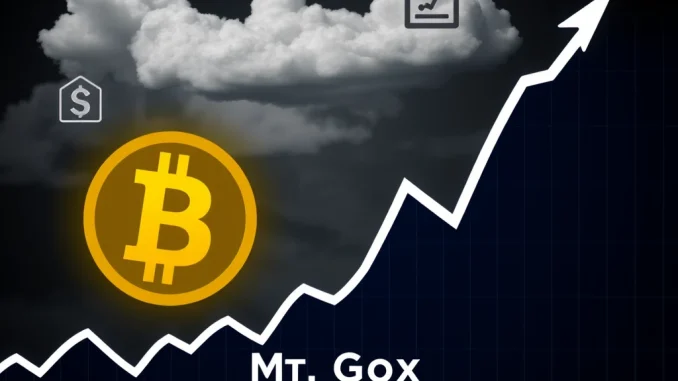
Hold onto your hats, crypto enthusiasts! The digital currency market has recently experienced a noticeable dip, leaving many investors wondering, “What’s going on?” Could it be the ghost of Mt. Gox finally catching up, or are broader economic anxieties casting a shadow over the crypto sphere? Let’s dive into the analysis to understand the potential triggers behind this crypto market drop and what it might mean for the future of digital assets.
Decoding the Crypto Market Drop: Is Mt. Gox to Blame?
According to Inky Cho, a seasoned financial markets strategist at Exness, the recent crypto market drop might be linked to a wave of panic selling. This panic, Cho suggests, was potentially ignited by the news of Bitcoin being transferred from wallets associated with the infamous defunct exchange, Mt. Gox. For those unfamiliar, Mt. Gox was once a dominant force in the Bitcoin exchange world before collapsing in 2014 after a massive hack. The exchange is now in the process of repaying creditors, and these Bitcoin transfers are part of that settlement process.
But how exactly does a Mt. Gox bitcoin transfer lead to a market downturn? Here’s a breakdown:
- Fear of a Sell-Off: The market anticipates that creditors receiving Bitcoin from Mt. Gox might sell these coins to recoup their losses. This perceived impending sell pressure can trigger preemptive selling from other investors, contributing to a price decline.
- Psychological Impact: The Mt. Gox saga is a dark chapter in crypto history. News related to it can evoke negative sentiment and remind investors of past market vulnerabilities, leading to cautious or risk-averse behavior.
- Uncertainty and Speculation: The exact timing and volume of potential Mt. Gox creditor sales are uncertain. This ambiguity fuels speculation and can increase market volatility.
It’s important to note that while the Mt. Gox bitcoin transfer is a plausible trigger, it’s likely not the sole factor at play. The crypto market is a complex ecosystem influenced by a multitude of variables.
Recession Fears: A Looming Shadow Over Crypto?
Adding fuel to the fire, Cho also points to comments from former U.S. President Donald Trump regarding a potential economic recession. These remarks have injected a dose of anxiety into both traditional stock markets and the cryptocurrency space. Recession fears generally lead investors to become more risk-averse, and this can impact asset classes perceived as volatile, such as cryptocurrencies.
Here’s how recession fears can contribute to a crypto market downturn:
- Risk-Off Sentiment: During times of economic uncertainty, investors often reduce exposure to riskier assets. Cryptocurrencies, despite their growing adoption, are still generally considered a higher-risk investment compared to traditional assets like bonds or cash.
- Liquidity Concerns: In a recessionary environment, investors may seek to increase their liquidity – meaning they prefer to hold more cash. This can lead to selling off assets, including cryptocurrencies, to raise funds.
- Correlation with Traditional Markets: As Cho highlights, Bitcoin’s correlation with the Nasdaq, a tech-heavy stock index, is currently around 40%. This means that when the stock market experiences downturns due to recession fears, Bitcoin can also be affected to some extent.
Bitcoin vs. Altcoins: A Diverging Path?
Interestingly, Cho observes a divergence in the behavior of Bitcoin and altcoins like Ethereum. While both initially reacted to the market pressures, they are starting to chart different courses.
Bitcoin (BTC): The Digital Gold Narrative Strengthens?
Cho suggests that Bitcoin is increasingly being viewed as a hedge against economic uncertainty and, notably, against U.S. tariffs. This aligns with the narrative of Bitcoin as “digital gold” – a store of value that can hold its own or even appreciate during economic turmoil. The rationale here is that:
- Decentralization Appeal: Bitcoin’s decentralized nature, outside of traditional financial systems and government control, becomes more attractive when faith in these systems wavers during economic downturns or trade disputes.
- Limited Supply: Bitcoin’s capped supply of 21 million coins contrasts with fiat currencies that can be printed by central banks, potentially leading to inflation. This scarcity can make Bitcoin appealing as a hedge against inflation, which can be a concern during economic instability.
- Tariff Hedge Potential: If tariffs escalate and disrupt global trade, Bitcoin, as a borderless and neutral asset, might be seen as a safe haven, insulated from the direct impacts of trade wars.
Altcoins (ETH and Others): Still Tied to Tech Stocks?
In contrast, altcoins, including Ethereum (ETH), appear to remain more closely linked to the Nasdaq. This suggests that altcoins are still largely perceived as risk-on technology investments, similar to tech stocks. This correlation might stem from:
- Tech-Driven Innovation: Many altcoins are associated with innovative technologies and platforms within the crypto space, which are often seen as part of the broader tech sector.
- Venture Capital and Tech Investment Flows: Investment in altcoins can be influenced by the same factors that drive investment in tech startups and growth stocks.
- Risk Sentiment Alignment: When investors become wary of tech stocks due to economic concerns, this risk-averse sentiment can also extend to altcoins.
Looking Ahead: Bitcoin as a Tariff Hedge?
Cho’s analysis points to a potentially significant long-term trend: Bitcoin’s role as a hedge against tariffs could become increasingly important, especially if trade tensions and economic instability persist or escalate. This perspective offers a compelling angle on Bitcoin’s evolving value proposition.
Actionable Insights for Crypto Investors:
- Stay Informed: Keep abreast of macroeconomic developments, including recession indicators and trade policy updates, as these can influence the crypto market.
- Diversify (Strategically): Consider the diverging trends between Bitcoin and altcoins. If you believe in Bitcoin’s hedge potential, you might adjust your portfolio accordingly. However, remember diversification is key to managing risk.
- Long-Term Perspective: Crypto markets are volatile. Focus on the long-term fundamentals and potential of the assets you invest in, rather than reacting impulsively to short-term market fluctuations.
- Manage Risk: Only invest what you can afford to lose, and be prepared for potential market swings.
Conclusion: Navigating the Crypto Waters Amidst Uncertainty
The recent crypto market drop serves as a reminder of the complex interplay of factors that can influence digital asset prices. While the Mt. Gox bitcoin transfer and recession fears appear to be contributing factors, the market’s reaction is multifaceted. The potential for Bitcoin to emerge as a stronger hedge against economic uncertainty and tariffs is a fascinating development to watch. As the crypto landscape continues to mature, understanding these dynamics will be crucial for navigating the market and making informed investment decisions. The journey of cryptocurrency is rarely a smooth ride, but by staying informed and adaptable, investors can better weather the storms and potentially capitalize on emerging opportunities.



